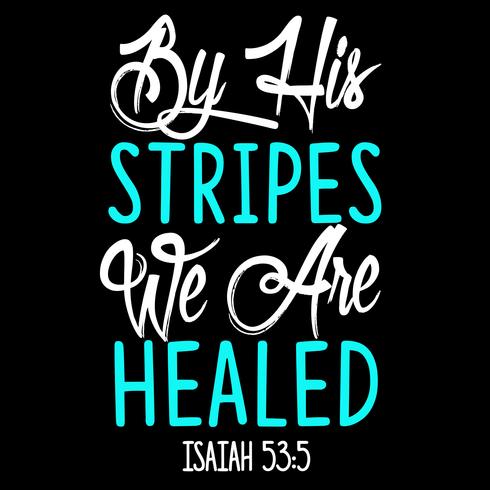

I was listening to Sid Roth on the internet, who is Jewish, and he said the word stripe could mean friend. The word is also used to reference the bonding between a husband and wife. However, the word as found in the Hebrew is chabar, Chet, Beth, Resh, which means the stripe of a tiger which also means to bind, to join a seam together. Translators assume that this is a play on the word habar which is spelled Hei, Beth Resh, which means to cut hence translators use this play on words to indicate the cuts Jesus received from being whipped. It is another play on words with the letters Chet and Hei. The word means stripe from the stripe of a tiger. Yet, it is His broken heart that will restore our peace.įinally, by His stripes we are healed. Think about it, His heart is broken by our iniquities which robs us of peace. Let not your heart be troubled, neither let it be afraid.

John 14:27: “My peace, I give unto you, not as the world gives, give I unto you. It was upon Him to instruct us in His peace. It could mean peace or safety, security, and even divine healing. The word peace (shalom) has a broad meaning. However, if we use the alternative explanation for this word this could read the instruction on peace was upon Him. Don’t ask how why the same word is used for punish and teach. It means punish but it also means to instruct or teach. Ever stop to think what that means? The word chastisement is yasar like in Yasar Araft.

The chastisement of our peace was upon Him. In other words it was from our iniquities he suffered a broken heart. In front of the word for iniquities is the preposition Mem which really is translated as from. The word is also used to express a broken or crushed heart. The word crushed is ‘daki’ which is in a pual form. Because His wounding or piercing was to redeem us from our transgressions, His words turn us to praise. The word is spelled “Chet, Lamed, Lamed.” The word for praise is Hei, Lamed, Lamed. It real means to pierce and being in a piel form would make it a fatal wound. The word wounded comes from the root chalal and is a piel participle form. I find the word wounded to be interesting. We must remember, for ourselves and for others, that a very great spiritual work may be happening in very unattractive circumstances.Isaiah 53:5: “But he was wounded for our transgressions, he was bruised for our iniquities: the chastisement of our peace was upon him and with his stripes we are healed.” The physical manifestations may not be attractive but-as Jesus repeated many times in the course of his ministry-it would be a sad mistake to judge according to outer appearances. From this perspective-and this, I think, is very much what the prophet is telling us-suffering may not be a sign of spiritual weakness, but rather a sign of spiritual strength! If we are centered in our creative power, we can process more of the negative energy that is polluting our collective consciousness. Because we are all one in spiritual consciousness, we also work together in spiritual consciousness to dissolve negative energies and beliefs. And so, when any of us is suffering, it is foolish to assume that they are being punished for their own sins (which would have been the belief prevalent at the time of Isaiah) or creating their own suffering from their own false beliefs. The Christ energy that is our true identity is both unique in each of us and the same in all of us. Metaphysically, I think the passage is based on the spiritual truth that we are all one in spirit. Many Christian commentators, of course, read it as a description of Jesus, although the outer details, at least, don't quite correspond. Problems of translation and interpretation prevent a clear understanding of what's being said-or who the “servant” is whose life is being described.

This passage, from the fourth of the so-called "Servant Songs" in Isaiah, has been the subject of much confusion and debate through the years. All we like sheep have gone astray we have all turned to our own way, and the Lord has laid on him the iniquity of us all" (Isaiah 53:4-6). But he was wounded for our transgressions, crushed for our iniquities upon him was the punishment that made us whole, and by his bruises we are healed. "Surely he has borne our infirmities and carried our diseases yet we accounted him stricken, struck down by God, and afflicted.


 0 kommentar(er)
0 kommentar(er)
